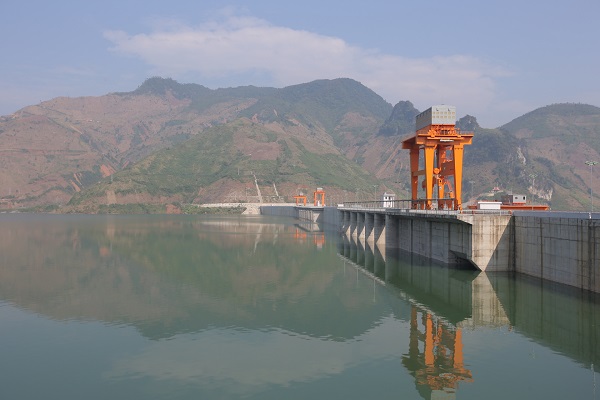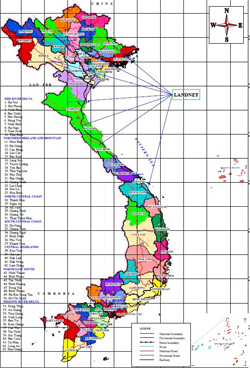ADVOCACY
The story of the Son La hydroelectric resettled community
- We used to live in Ca Nang commune, Quynh Nhai district, Son La province. Eleven years ago, we heard officials’ propaganda that, to move and live in the new place would be better than the old one. So we left behind our crops and transferred our land and land-associated properties to the government to build the Son La hydroelectric plant. Up until now we didn’t know that the compensation was not adequate. We are no longer satisfied with the compensation we received for land above 218m altitude (the submerged point of the Son La reservoir). Our forefathers and parents lived and worked on that land for a long time.
After our houses were acquired, due to the big Son La hydroelectric power, we came to be resettled in Tu Nang commune, Yen Chau district. However, here we were affected by the small hydroelectric of To Buong. We were given upland fields on one side of the stream while our houses were located on the other side. However, the To Buong hydroelectricity dam discharges large amounts of water and this destroyed the road linking the villagers’ houses and their upland fields.
Our village management board, comprised of 8 mass organizations, discussed this issue with the To Buong hydroelectric company several times. In the third meeting, the company representatives promised to start to rebuild a bridge for the affected people from October 15, 2019. The community representatives said it would not be possible to wait that long because the road was necessary to transport the coming corn harvest. Some people, who understood citizen’s rights took photos and videos of this meeting. There were representatives of the company, commune officials and district police attending the meeting. We assumed that the police had come here to protect the people by law.
The Hydroelectric Company insisted that they could not start to rebuild the bridge before October 15. We could accept this so we had to put pressure on the company, and asked them to suspend the generation of electricity from the meeting date (10 October) until the road was finished for the locals. Villagers requested the company to prepare materials immediately after the meeting and for the company to rebuild the road within 3 days. Representatives of the company agreed to start repairing the road from 11 October, but actually started the construction on 19 October. By the end of December 2019, the road was completely rebuilt.
In the past the villagers were not familiar with the district police officers and we did not understand each other. The relationship is getting better and we can now joke with each other. Some people made a petition to the district and provincial authorities to request a review of the compensation. In response some police officers brought beer to our house to meet us to “talk” (but actually to investigate). Someone said half jokingly that: "Are you bringing beer to bribe the people? If so, you guys have broken the law and professional principles, because you are not wearing uniforms and and have not brought your titling cards. ” The police themselves opened and poured beer and invited the host to drink. Then they wrote minutes, noting where we went and who we met to get legal advice. There was, however, only one original copy of the minutes, which contained some errors. The landlord, therefore, did not sign and said: “My signature is valuable, I do not sign photocopies. If there is only one copy, and I need to keep the original minutes, then, how can you guys get the copied and signed minutes back to your office? It is best to offer at least one copy for each party, then I will sign.” Afterwards, the police ran to the communal center to type, correct errors and give one copy to each party. The landlord agreed to sign it.
This story exemplifies these principles: When people understand the law, they can act to protect their rights according to law. If people are reluctant, it is difficult to succeed. When people address their opinion clearly, the company must pay attention and respond to the people’s legitimate interests. With the proliferation of technology nowadays, we need to obtain documents and evidence, to follow the correct legal order, and consult with lawyers. In addition, mobile phone applications such as WhatsApp or Signal are very good at making people feel confident in exchanging experiences with each other in a regular and safe manner. Those are the essential experiences in the protection of the legitimate rights of our hydropower affected people.
 After our houses were acquired, due to the big Son La hydroelectric power, we came to be resettled in Tu Nang commune, Yen Chau district. However, here we were affected by the small hydroelectric of To Buong. We were given upland fields on one side of the stream while our houses were located on the other side. However, the To Buong hydroelectricity dam discharges large amounts of water and this destroyed the road linking the villagers’ houses and their upland fields.
After our houses were acquired, due to the big Son La hydroelectric power, we came to be resettled in Tu Nang commune, Yen Chau district. However, here we were affected by the small hydroelectric of To Buong. We were given upland fields on one side of the stream while our houses were located on the other side. However, the To Buong hydroelectricity dam discharges large amounts of water and this destroyed the road linking the villagers’ houses and their upland fields.





















